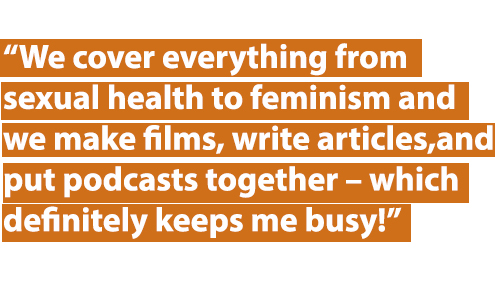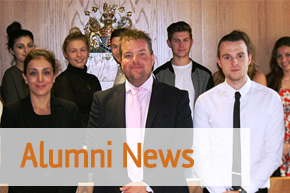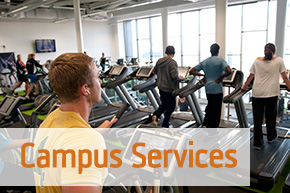Bridget Hamilton
MA Radio 2015
Graduate Bridget Hamilton spent eight months talking about periods. As part of her final project, she produced a three-part radio documentary on menstruation called Seeing Red.
Bridget, 26, from Kent, said: “I’m particularly proud of my final project for the MA, not only was it a massive job covering everything from historical interpretations of periods all the way to modern day marketing (and the dreaded ‘tampon tax’), it was also a tough documentary to ‘market’ to other people.
“Telling your boyfriend’s grandparents what your dissertation was about became a bit awkward.”
The documentary not only gained her a distinction but was also very well received in the community radio sector.
“I have been to a few conferences to speak about it and wrote an article for the Huffington Post on everything I learnt whilst putting the project together,” she explained.
Bridget is a freelance radio producer and writer. She has worked on the early breakfast and mid-morning shows on BBC Radio Newcastle, as well as on a few other projects. She also founded Verbal Remedy in 2013 - a social enterprise using media and blogging to talk about tough issues.
Bridget said: “We cover everything from sexual health to feminism and we make films, write articles, and put podcasts together – which definitely keeps me busy! We have a team of around 25 writers so I manage them as well as the day-to-day running of the website and social media.”
It’s not surprising that Bridget is constantly looking for inspiration for all the content she produces.

“I keep my ear to the ground and follow lots of other blogs producing similar content to me. I read lots of books and magazines, I have my favourite websites that I keep up to date on, and I always have a notebook on me so I can note down any ideas before they go out of my head. People often say you can’t write a good book if you don’t read any – I think you can apply that to any sort of creative project.”
Asked about her biggest challenge, the 24-year-old commented: “Not everyone is forthcoming or open about some of the topics I cover, which is not unexpected but can make things hard.
“All radio broadcasters know the sinking feeling of standing on the high street in the cold with nobody wanting to speak to you, or of interviewees cancelling at the last minute.
“I’ve learnt not to be precious about things, but to trust that for every person whose PA declines an interview, there is somebody else articulate and willing to speak to me.”
Bridget, who had previously gained a bachelor’s degree in English at Newcastle University, had always been passionate about radio and knew the next step in her career was to complete an MA in Radio. As she wasn’t ready to leave the North East, she looked for a Masters that had great facilities, could help her to fulfil her career ambitions and was in the place she loved.
She added: “I really enjoyed the course itself. I loved the fact that we were encouraged to try our hand at absolutely everything – I put together pieces that I would have otherwise not have ever dreamt of creating, such as a radio drama and a 60-minute music show. We each also got the opportunity to produce a live radio programme, which was nerve-wracking but fantastic.
“The facilities at the David Puttnam Media Centre are second to none, but what I appreciated most was the staff.
“My dissertation supervisor, Caroline Mitchell, was one of the founders of the first all-female radio station in 1992 and Andy Cartwright, programme leader of the MA, runs his own production company (as well as once working on The Archers). All of the tutors had so much to offer us in terms of expertise and I massively valued that.”
Bridget’s future plans include growing Verbal Remedy across the next few years and continuing to make thought-provoking radio independently.
She concluded: “Better technology and social media now mean that people are actively choosing to make podcasts and independent documentaries and promote them online – gone are the days of posting CDs out to radio stations.
“On the Internet, you can be as experimental as you like and still have a potential audience of millions. I really love the freedom of that – I’m already brainstorming what to make next.”


